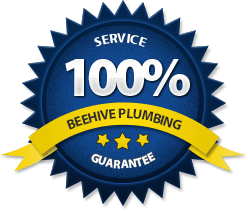If your home has a well system, then it’s crucial to address any low water pressure as quickly as possible!

It’s always annoying and inconvenient when your home is experiencing low water pressure, but these types of plumbing dilemmas are even more serious when your home’s water supply runs on a well system.
There are countless properties throughout northern Utah that have wells, and these homeowners have to be particularly careful about their plumbing system maintenance and repairs.
The Beehive Plumbing team is here to support the long-term durability of your well system, and we’ll be there for you when you’re experiencing low water pressure throughout your home. Below is an overview detailing how we address low water pressure issues in residential well systems!
Common Fixes For Low Water Pressure In Well Systems
There are many different issues that can cause low water pressure in residential well systems, and below are some of the most common repairs that our specialists will help you with during these scenarios:
Cleaning Out Clogged Fixtures & Faucets
Over long periods of time, plumbing fixtures and faucets will build up with mineral and sediment deposits—which create pesky clogs. This is particularly an issue in northern Utah, and homes with well systems have to be especially cautious when it comes to filtration and water softening.
Your faucet aerators also need to be cleaned on a regular basis, because clogged aerators could play a significant role in contributing to low water pressure.
Adjusting Your System’s Pressure Switch
Sometimes it’s necessary for homeowners to address their well system’s pressure switch when they’re experiencing low water pressure. Below are five steps that detail how to make these types of adjustments:
- Turn off your well pump’s electrical circuit.
- Use an air pressure gauge to test your air fill valve, and see where the pressure is.
- If your water pressure is below 40 psi, adjust the pressure switch accordingly to increase your system’s pressure.
- Turn the electrical circuit back on, and open up a faucet to test the water pressure.
Clearing Out Clogged Water Lines
It’s possible that mineral and sediment buildup are disrupting your home’s water pressure deep within your water lines.
The good news is that our drain cleaning experts will help you identify the root cause of your clogged water lines, and thoroughly resolve the issue as soon as possible.
And although it’s technically possible to conduct your own DIY drain cleaning, it’s generally best to leave these types of plumbing services in professional hands in order to resolve your issue once and for all!
Water Softener Installations
Hard water is a huge issue in our region, and it refers to the excessive amount of mineral buildup that’s found within our municipal water supplies. Homes with well systems also have to be particularly careful about the hardness of their water, and water softeners are incredible advancements that have revolutionized our local industry.
We’ll typically install a water softener as a point-of-entry appliance that helps soften your well system’s water prior to it entering your well tank, which subsequently supports the water quality for your entire property.
Water Pressure Regulator Installations
We also help households with water pressure regulator installations, and there are two types of regulators that you’ll have to choose from. These options include:
- Booster pumps that help increase water pressure throughout an entire property. These are good options if your home’s water pressure is currently below 30 psi.
- Constant pressure systems that help maintaining the overall consistency of your home’s water pressure, based upon changes in your water demands.
Other Plumbing Issues That Could Be Causing Your Well System’s Low Water Pressure
It’s also common for northern Utah homes to experience plumbing infrastructure issues that then contribute to low water pressure dilemmas. Some of these common plumbing issues include:
- Damaged pressure tank: You’ll inevitably experience low water pressure when your well system’s pressure tank is leaking or damaged. It’s possible that we’ll be able to help you repair your pressure tank, or we’ll provide a replacement tank if necessary.
- Old well pump: Although well pumps are typically capable of lasting around 15 years, this type of longevity will largely depend upon how often the pump is utilized. If your home’s well pump is over 15 years old, it could mean that it’s time for a replacement.
- Narrow pipes: There are certain scenarios in which a household’s pipes simply are too narrow to meet water demands. In this type of scenario, our repiping services may be required.
Reach Out To Beehive Plumbing When You Need Help With Your Home’s Well System!
Beehive Plumbing has supported the northern Utah community for decades, so we’ve helped countless homes with residential well systems. Low water pressure is unfortunately common within these types of plumbing systems, but you’ll be in good hands when our Master Plumbers come over to check out what you’re currently dealing with.
Reach out to us online or call us at 801-849-3834 to get in touch with our team today and let us know what type of low water pressure your home has!













